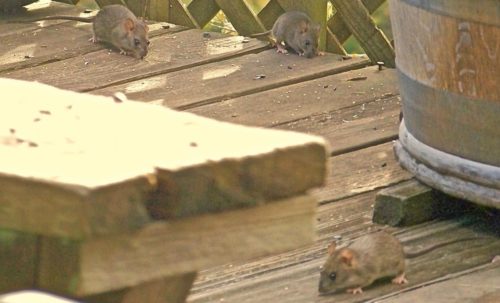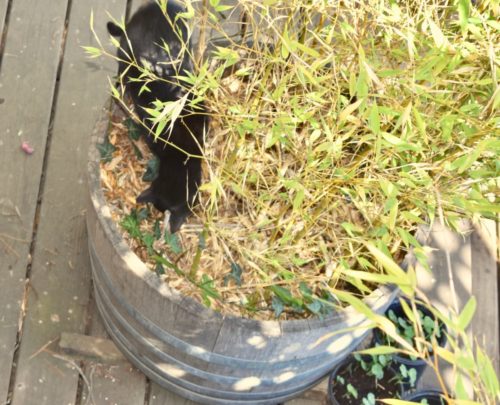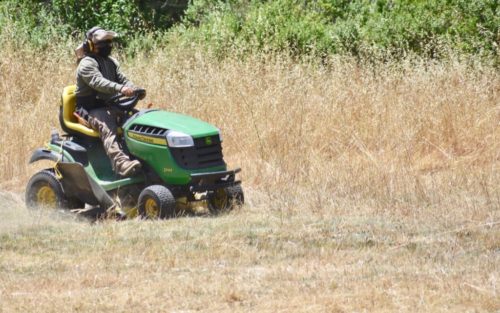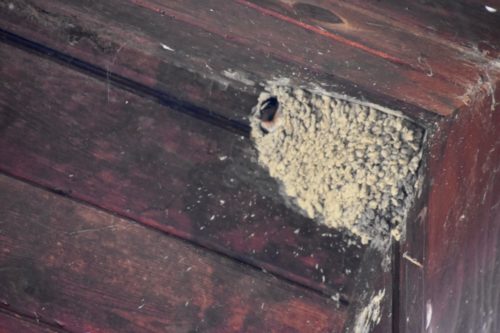Entries tagged with “thistles”.
Did you find what you wanted?
Thu 10 Jun 2021
Posted by DavidMitchell under Uncategorized
Comments Off on Roof rats, swallows, and thistles
Caveat lectorem: When readers submit comments, they are asked if they want to receive an email alert with a link to new postings on this blog. A number of people have said they do. Thank you. The link is created the moment a posting goes online. Readers who find their way here through that link can see an updated version by simply clicking on the headline above the posting.
Roof rats are a fact of life throughout West Marin, causing extensive damage by chewing on stored belonging and particularly on the wiring of automobile engines. A couple of times over the years, Cheda’s Garage has repaired rat damage to my cars.

Roof rats on Mitchell cabin’s deck eating leftover seeds scattered for the birds.
Of recent, the rats have annoyed my wife Lynn by eating the buds off a potted camellia I had given her as a Valentine’s present several years ago. On Tuesday, Newy, the stray cat we’ve adopted, went digging in a wine-barrel half that holds a clump of bamboo. Immediately an adult rat jumped out of a second hole on the other side of the barrel and ran off.

Newy kept on digging and soon caught a baby rat. Here she leans into the barrel to inspect a rat hole before sticking her claws into the creatures at the bottom. She had already snared one newborn (at left) and ultimately caught a total of four.

The newborn roof rats were so young their eyes hadn’t yet opened. Nor had they grown fur coats. Nature red in tooth and claw reveals where Newy grabbed the first unlucky creature.
________________________

Jesus to the rescue. As noted here last week, the grass around Mitchell cabin needed to be cut ahead of the fire season. In addition, the fields were becoming dotted with clumps of prickly thistles. As I’ve done in previous years, I called Jesus Macias who showed up Monday with a riding mower and two weed-whacking helpers.
They did a great job but had to leave a small patch of grass near the kitchen uncut because of a swarm of bumblebees there. Luckily I was able to cover myself up so completely two days later that I managed to weed-whack that patch without getting stung. A small swarm did form, but I left before they went after me.
Reader Mike Gale, a Chileno Valley beef rancher, responded to last week’s reference to the Mother Goose rhyme’s timing for cutting thistles: “Cut thistles in May,/ They’ll grow in a day;/ Cut them in June,/ That is too soon;/ Cut them in July,/ Then they will die.”
As was noted, however, Mother Goose rhymes were originally penned 300 years ago in the more-northern latitudes of England and France, where the growing season starts later. Thistles in West Marin need to be cut a month earlier. “Yes, this is the time for the attack mode,” Mike wrote me. “Unfortunately thistles are probably the last species to be affected by the drought.”
_________________________

Still swallowing. Another item in the last posting concerned cliff swallows building a nest in the eves above our kitchen door. We’ve now seen at least two adult swallows in the mostly completed nest, prompting me to read a startling fact about cliff-swallow nesting.
“Individuals often lay eggs in other individuals’ nests within the same colony,” the US Fish and Wildlife Service reports. “It has been observed that some [of these] parasitic swallows have even tossed out their neighbors’ eggs and replaced them with their own offspring.”
Tue 22 May 2012
I was rounding a curve while driving up to Mitchell cabin last week when I encountered a doe in my driveway. I stopped so she could calmly move on, but while I watched, two small fawns struggled out of tall grass and crossed the driveway in front of my car to catch up with their mother.

No doubt the mother would have preferred to proceed into the field in front of her, but in order to feed her hungry offspring, she was willing to accept my being present.
 The fawns were so small they frequently disappeared while walking in tall grass.
The fawns were so small they frequently disappeared while walking in tall grass.
When following their mother through the grass, the fawns at times had to bound over it to make any progress.
The fawns never got too far away from the doe, but they were even more intent on staying close to each other.
As I observed them from the driveway and later from my deck, the ability of their spots t0 camouflage them became all the more evident.
If their mother leaves them on their own while she forages, the fawns lie down in the grass. Should danger approach, they don’t move and even slow their breathing. This trait has in the past allowed me to stand over a motionless fawn, bend the grass aside, and snap a photo.
I later asked Point Reyes Station naturalist Jules Evens about the fawn’s not flinching while I photographed it from just a couple of feet overhead. “He probably thought he was invisible,” Jules replied.

The fawns, however, can no longer count on their spots and diminutive size for hiding in my grass. Tractor operator Gary Titus of Tomales came by last Thursday and mowed my fields and my neighbors’. The county fire department requires us to do this every year in the interest of homeland security.

Making a few spring days agonizing is the annual removal of thistles. I’ve already put in five full days cutting hundreds of thistles and weed whacking others that I could not easily cut by hand. My partner Lynn Axelrod spent three days at it.
I also cut thistles in two neighbors’ fields because if I don’t reduce their thistle problems, they will quickly add to my thistle problems.
As a result, the garbage company in the last month has hauled four green-waste containers’ worth of thistles from Mitchell cabin. That represented the contents of 12 tightly packed contractors’ bags.
Days later, Lynn and I are still finding thorns in our arms, hands, and socks. (The stickers don’t all come out in the wash.) Our faces are sunburned, and we’ve both been exhausted by the end of several thistle-cutting days.

Back on the ecstasy front, we have more quail pecking around Mitchell cabin this spring than I’ve seen in the last several years.
Looking every bit as self-important as a courtier during the reign of King George I, this portly fellow struts along the railing of my deck.
A little ecstasy cum agony: For the first time last week, a peacock showed up here. Perched on the limb of a tree next to the house, it was the first peacock I’ve ever seen at Mitchell cabin although I used to frequently see them around Nicasio.
By the way, it’s true what people say: their calls sound like a woman screaming in distress. At first, having a peacock around was fun, but after its piercing screams started waking Lynn up in the early morning, she soon became impatient with the bird.

Signs of life. Lynn was walking down our outside steps last week when she noticed on the ground half the shell of a small egg. With it were a couple of shell fragments and a bit of a nest.
 On our next trip downtown, Lynn and I stopped by the Institute for Bird Populations where Rodney Siegel determined that, based on the egg’s size and spot, it belonged to a towhee (left).
On our next trip downtown, Lynn and I stopped by the Institute for Bird Populations where Rodney Siegel determined that, based on the egg’s size and spot, it belonged to a towhee (left).
There was no tree over the spot where the egg was found, but Rodney told us towhees nest on the ground. After the eggs hatch, the mother towhee often takes parts of the shell out of the nest, flies a short ways, and dumps them on the ground.
Lynn and I were worried that another bird or four-footed predator had stolen the egg from the nest and eaten its contents. Rodney, however, said the broken edge of the shell was typical of what remains after a chick pecks its way out.

Since a woodstove is the only source of heat in Mitchell cabin, I need to regularly haul loads of firewood from a woodshed uphill to the house. Carrying the loads used to require a fair amount of exertion, but Anastacio Gonzalez of Point Reyes Station advised me to try carrying heavy loads the way campesinos (field workers) do.
Great idea. One’s legs, not one’s back or arm muscles, bear most of the load, making it seem light. I’d put this revelation in the ecstasy column.
Tue 3 May 2011
Posted by DavidMitchell under General News, Wildlife
Comments Off on Charge ahead! or pay cash
“What do you think of that Osama deal?” a guy passing through Point Reyes Station asked a couple of us in the barbershop Tuesday. I was a bit surprised by how he phrased the question but said the death of Osama bin Laden should over time make the world a safer place.
“It might have been a big deal if it had happened in 2002 or 2003,” the traveler said. “Now it’s a matter of: ‘So bin Laden’s dead, how ’bout those Giants?'”
 The other two of us saw the death as more momentous, insisting that bin Laden (at left) was a ruthless fanatic who would have continued to order terrorist attacks were he still around to lead al Qaeda.
The other two of us saw the death as more momentous, insisting that bin Laden (at left) was a ruthless fanatic who would have continued to order terrorist attacks were he still around to lead al Qaeda.
However, neither of us thought bin Laden’s death would put an end to all terrorism.
Probably most Americans are relieved that the mastermind of 9/11 has finally been brought to justice. Governments of several Muslim countries have also expressed approval of the raid that killed him. The the man on the street in much of the Muslim world, however, is as indifferent as the traveler in the barbershop to bin Laden’s demise.
In the Middle East, bin Laden and al Qaeda have been overshadowed by rebellions in Tunisia, Egypt, Libya, Yemen, Bahrain, and Syria. Bin Laden had become a relic from a bygone era.
So the stranger was unquestionably right about one thing: during the 40 minutes that justice was catching up with Osama bin Laden, billions of other people were going about their lives as always. To most people, change is inevitable except from a vending machine.

On my hillside, Sunday was the start of the thistle-pulling season, but thanks to a fortnight of prickly eradication a year ago, there are far fewer thistles in my field this year. Little did my girlfriend Lynn and I know that as we labored, President Obama was preparing to announce that the biggest prick of all had been eradicated halfway around the world in an Abbottabad, Pakistan, mansion.
He was a meglomaniac who liked to blow things up and who had inherited millions of dollars by the time he was 14. Despite advocating asceticism for others, Osama bin Laden was found living in luxury with three wives, a stash of pornographic magazines and videos in his bedroom, and hundreds of marijuana plants growing in rows among cabbages and potatoes just outside his walls.
He died when shot in the eye and chest during an incredibly precise, 40-minute raid by Navy SEALs. (If you’ve ever wondered about the acronym, it stands for Sea, Air, and Land Navy Special Warfare Unit.)
When I published The Point Reyes Light, I editorialized in favor of the US going after bin Laden in Afghanistan and against our going after Saddam Hussein in Iraq. During the buildup to the Iraq War, I tried to warn then-President George W. Bush, but did he listen? Noooo. Presidents are notorious for ignoring small-town editors, and as I predicted, we ended up in a war from which we still cannot extricate ourselves.
“You can always count on the Americans to do the right thing, after they have tried everything else.” Winston Churchill

Eradicating thistles was a bit tricky Sunday because many were hidden by unusually tall grass, the result of a wet winter. Here a fawn and a doe are barely visible as they graze below my deck.

Far from the turmoil in the Middle East, evenings around my cabin are still filled with foxes, raccoons, and the occasional possum. Here a gray fox carefully approaches a raccoon eating peanuts outside my kitchen door. (Photo by Lynn Axelrod)
“I’ve had a perfectly wonderful evening, but this wasn’t it.” Groucho Marx

The raccoon isn’t happy to have the fox share its dinner, but it would rather go on eating than waste time fighting over the bounty. (Photo by Lynn Axelrod)
Watching two competing species learn to accommodate each other started me musing. Bin Laden with all his money and religious fanaticism was less civilized than a pair of wild animals. Merely attending a mosque hadn’t made him a true Muslim any more than standing in a garage would have made him a car.
 The possum at right, like all the other animals in this posting, were photographed around my cabin during the past week.
The possum at right, like all the other animals in this posting, were photographed around my cabin during the past week.
Caught by surprise in Inverness Park. On Monday I stopped by Perry’s Delicatessen to buy a couple of pouches of Captain Black pipe tobacco.
“I always buy it here rather than over the hill because I want to patronize a local merchant,” I told owner Dan Thompson, only to have him correct my pronunciation. “You pat-row-nize merchants,” he said. “You don’t pay-trow-nize them.”
Regularly buying from a merchant is obviously different from condescending to him, but it had never before occurred to me that the pronunciation changed with the meaning. Might the difference be a matter of British versus American English? One point for the deli owner, as well as West Marin wildlife. Zero for bin Laden, as well as thistles.



















